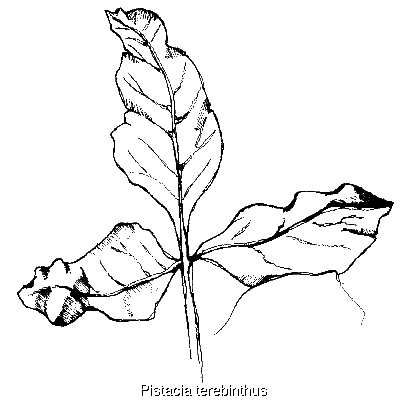TEREBINTH
(Pistacia Terebinthus)

Appearance
A deciduous shrub with compound shiny leaves with a strong
resinous smell. Leaves of 4-5 pairs of leaflets and, unlike the similar
Pistacia Lentiscus, a terminal leaflet. Flowers, which appear between
March and April, in close compound clusters, reddish-purple in colour
growing from end of previous years shoot. Fruit small, globular nutlets
which are brown when ripe.
Habitat
In Cyprus the Terebinth is found growing on dry rocky slopes and
hillsides or in pine forests, particularly in the Troodos and Kyrenia
ranges, from just above sea level to 4,000 ft.
Uses and Properties
The fruits are used in the baking of a speciality village
bread. The plant is rich in tannin and resinous substances and has
been known for its aromatic and medicinal properties since classical
times, Theophrastos described the resin as having excellent fragrant and
setting qualities. A mild sweet scented gum can be produced from the
reddish bark and the large reddish horn-like galls often found on the
plant are used for tanning leather. Terebinths are traditionally planted
over Armenian graves.




